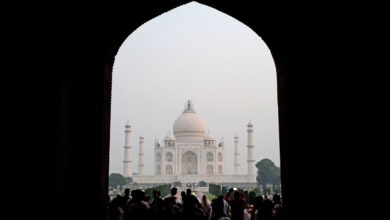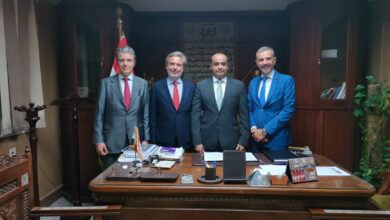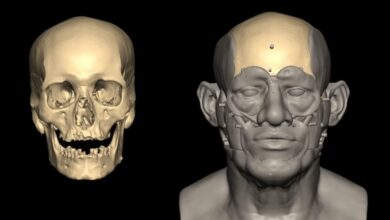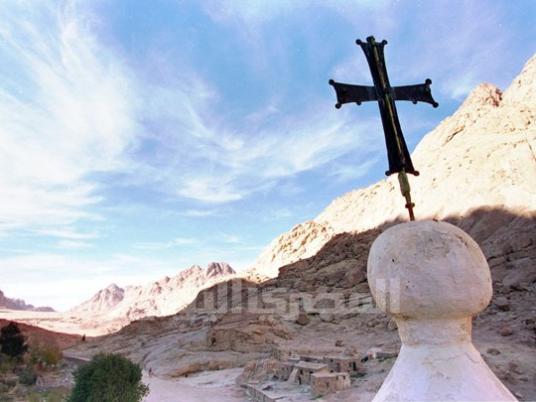Zahi Hawass, Egypt’s foremost archaeologist and secretary general of the High Council of Antiquities, caused a stir in the UK a few days ago when he demanded through the BBC the return of the Rosetta Stone to Egypt, in line with his policy of retrieving Egyptian artifacts scattered in museums throughout the world.
The incident happened just a few weeks after Zahi suspended excavations in Saqqara that were being carried out in cooperation with the Louvre, until the French museum finally agreed to give up five stolen wall fragments that originally belonged to a tomb in the Valley of the Kings.
Zahi Hawass’s battle to recover pieces from Egypt’s looted heritage has generated great concern on the part of museum directors in Europe and the United States, who consider these pieces to be part of world heritage. Hawass, a trim, energetic man who has been in office since 2002, Hawas has recently been appointed by President Mubarak as vice-minister of culture.
In true swashbuckling character, Zahi Hawass spoke to Al-Masry-Al-Youm from his office in Zamalek.
Al-Masry Al-Youm: You travelled to London last week for a book signing and a lecture, and during the trip you declared on the BBC that you wanted to recover the Rosetta stone from the British Museum, instead of taking this important piece as a temporary loan. Why?
Zahi Hawass: First I asked the British Museum for a loan of the Rosetta Stone in the context of a temporary exhibition. They said “No” in a very polite way: instead of being straightforward about it, they argued that they needed to know the exact measurements and the security of any place their artifacts will be sent to. I felt insulted because we regularly send exhibitions to the British Museum; we have scientific cooperation with them. So now I’m going to fight to recover this major piece. Unique pieces should be in Egypt, it is very important. I’m not after every artifact from Egyptian heritage, but just six of them: the bust of Nefertiti, the Rosetta Stone, the Zodiac of Denderah, the statue of the architect of the great pyramids, the statue of
the architect of the second pyramid, and the statue of Ramses II. I am now particularly concerned with the bust of Nefertiti. On 20 December I will be meeting with the director of the Neues Museum which holds this piece. Regarding the Rosetta Stone, I want it back. But I will concentrate on it as soon as the issue of the Nefertiti bust is solved.
Al-Masry: What kind of pressure are you ready to use to retrieve these pieces?
Hawass: Pressure will be generated through the organization of a meeting with countries that have also been victims of heritage looting. We need to take united action, call the press, and attack! Then our respective artifacts will be brought home.
Al-Masry: Can you be a little bit more specific about this meeting with other countries?
Hawass: It will be held in 2010, hopefully in March, and will bring together 12 countries that have great civilizations and whose artifacts have been stolen, like ours. At the end of the meeting we will come up with a “wish list” that will include the pieces we want back. Greece, Turkey, Ghana… We haven’t really decided which countries are going to be part of this gathering yet. Uniting our forces to fight will give us much more power of persuasion.
Al-Masry: President Hosni Mubarak will today in Paris officially receive from from Nicolas Sarkozy the last stolen fragment of Tetiki’s wall. Do you think this is significant?
Hawass: It is an important step because it shows the world that museums should not buy stolen artefacts. And we thank the Louvre for this rapid retrieval and the fact that President Mubarak is receiving it is fantastic and we will accept their teams to work in Egypt again.
Al-Masry: It is a commonly heard argument, used to justify the holding of artifacts in museums abroad, to say that such pieces belong to the heritage of mankind and not only to Egyptian heritage. What do you think about this?
Hawass: That’s not true. They belong first to Egypt, the motherland that produced civilization. And only after that do they belong to world heritage. The Nile was raped for many centuries. I am here to return what the world stole from us. I have already recovered 5000 pieces and I plan a major exhibition at the Egyptian Museum at the end of January to display these artifacts to the Egyptian public.
Al-Masry: Speaking of museums, how is the project for the Grand Egyptian Museum (GEM) advancing?
Hawass: We have finished the conservation labs and the equipment and we have chosen the company that will administer the whole project. We have five more years to finish it. And I hope that I will have recovered all the pieces I am after in time for the opening in 2014.
Al-Masry: You have been putting a lot of energy into the GEM project, as well as the Akhenaton Museum, the Greco-Roman Museum and the Sohag Museum. Does this account for the poor maintenance of the Egyptian Museum which has obviously been neglected?
Hawass: No! We are working, and the Egyptian Museum is changing, and it’s beautiful now! We are painting the whole museum, lighting it, the east side has an open museum that will open next month, and on the west side there are big bookstores. The visitor, entering the premises of the museum, will pass through a nice restaurant and a cafeteria. When the artifacts are moved to the GEM in 2014, the current museum will host only the masterpieces of Egyptian art.
Al-Masry: As a very popular character, how do you balance the media, entertainment and serious archaeological research?
Hawass: I use the media to help us. The face of Egypt has always been shaped by foreigners, and now for the first time Egyptians are in charge of shaping their country. And this has upset many people.
Al-Masry: You’ve recently published the book entitled “The Lost Tombs of Thebes: A Life in Paradise,” which gave you unprecedented access to the beauty of the tombs of the Pharaohs’ servants. Have you opened all of these tombs?
Hawass: No, we tried to open some only, because if we open all of them we will damage them. We will use a rotation system, opening some tombs this year, and different ones next year… because this is the only way to actually protect them. Some of them are situated under the village of Gourna, but the majority of them are near villages in Sheikh Abdel Gourna, el-Khoukha, Dir el-Medina, Dir Abul Naga, etc. We excavated underneath and found many tombs there.
Al-Masry: You were recently appointed as vice-minister of culture by President Mubarak. What do you think of this nomination?
Hawass: No benefits, except that I will not have to retire anytime soon. So I will be able to finish the Grand Museum, the Civilisation Museum, the work at Saqqara, the Museum in Minya…
And of he went to catch another appointment!




